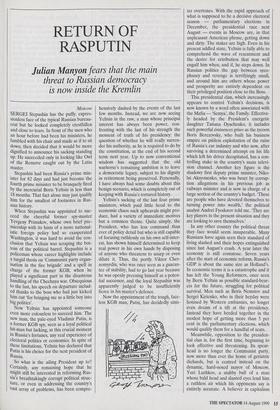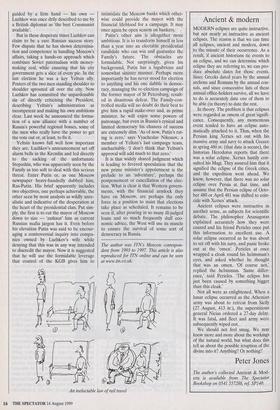RETURN OF RASPUTIN
Julian Manyon fears that the main
threat to Russian democracy is now inside the Kremlin
Moscow SERGEI Stepashin has the puffy, expres- sionless face of the typical Russian bureau- crat but he looked completely crestfallen and close to tears. In front of the men who an hour before had been his ministers, he fumbled with his chair and made as if to sit down, then decided that it would be more dignified to announce his sacking standing up. He succeeded only in looking like Owl of the Remove caught out by the Latin master.
Stepashin had been Russia's prime min lister for 82 days and had just become the fourth prime minister to be brusquely fired by the mercurial Boris Yeltsin in less than 18 months. That fact alone may just qualify him for the smallest of footnotes in Rus- sian history.
When Stepashin was appointed to suc- ceed the cheerful former spy-master Yevgeny Primakov, whose own brief pre- miership with its hints of a more national- istic foreign policy had so exasperated Washington, it was hard to avoid the con- clusion that Yeltsin was scraping the bot- tom of the political barrel. Stepashin is a policeman whose career highlights include a turgid thesis on 'Communist party organ- isation in the fire brigade' and a spell in charge of the former KGB, when he played a significant part in the disastrous handling of the Chechnya war. Obsequious to the last, his speech on departure includ- ed thanks to the boss who had just kicked him out 'for bringing me as a little boy into big politics'.
Now Yeltsin has appointed someone even more colourless to succeed him. The new man, the pale-eyed Vladimir Putin, is a former KGB spy, seen as a loyal political hit-man but lacking, at this crucial moment in Russia's fortunes, any real experience of electoral politics or economics. In spite of these limitations, Yeltsin has declared that Putin is his choice for the next president of Russia.
So what is the ailing President up to? Certainly, any remaining hope that he might still be interested in reforming Rus- sia's breathtakingly corrupt political struc- ture, or even in addressing the country's vast array of problems, has been compre- hensively dashed by the events of the last few months. Instead, we are now seeing Yeltsin in the raw, a man whose principal interest has always been power, con- fronting with the last of his strength the moment of truth of his presidency: the question of whether he will really surren- der his authority, as he is required to do by the constitution, at the end of his second term next year. Up to now conventional wisdom has suggested that the old warhorse's remaining ambition is to leave a democratic legacy, subject to his dignity in retirement being preserved. Personally, I have always had some doubts about this benign scenario, which is completely out of keeping with Russia's tortured history.
Yeltsin's sacking of the last four prime ministers, which paid little heed to the economic chaos such upheavals might pro- duce, had a variety of immediate motives but a common theme. Quite simply, the President, who has less command than ever of policy detail but who is still capable of focusing ruthlessly on his own self-inter- est, has shown himself determined to keep real power in his own hands by disposing of anyone who threatens to usurp or even dilute it. Thus, the portly Viktor Cher- nomyrdin, who was once seen as a guaran- tee of stability, had to go last year because he was openly preening himself as a poten- tial successor, and the loyal Stepashin was apparently judged to be insufficiently fierce in his master's defence.
Now the appointment of the tough, face- less KGB man, Putin, has decidedly sinis- ter overtones. With the rapid approach of what is supposed to be a decisive electoral season — parliamentary elections in December, the presidential race next August — events in Moscow are, in that unpleasant American phrase, getting down and dirty. The stakes are high. Even in his present addled state, Yeltsin is fully able to comprehend the wave of resentment and the desire for retribution that may well engulf him when, and if, he steps down. In Russian politics the gap between syco- phancy and revenge is terrifyingly small, and around him are others whose power and prosperity are entirely dependent on their privileged position close to the Boss.
This presidential clan, which increasingly appears to control Yeltsin's decisions, is now known by a word often associated with the Mafia — `Semya', the Family. Effective- ly headed by the President's energetic daughter Tatiana Dyachenko, it includes such powerful eminences grises as the tycoon Boris Berezovsky, who built his business empire on pitiless exploitation of the ruins of Russia's car industry and who now, after surviving a determined attempt on his life which left his driver decapitated, has a con- trolling stake in the country's main televi- sion channel. Another key figure is the shadowy first deputy prime minister, Niko- lai Aksyonenko, who was beset by corrup- tion allegations in his previous job as railways minister and is now in charge of a large section of the country's budget. 'These are people who have devoted themselves to turning power into wealth,' the political analyst Andrei Fyodorov told me. 'They are key players in the present situation and they are looking to save themselves.'
In any other country the political threat they face would seem insuperable. Many Russians have again seen their standard of living slashed and their hopes extinguished since last August's crash. A year later the economy is still comatose. Seven years after the start of economic reform, Russia's GDP is about the same size as Holland's. In economic terms it is a catastrophe and it has left the Young Reformers, once seen by Boris Yeltsin as possible standard-bear- ers for the future, struggling for political survival. Men such as Boris Nemstov and Sergei Kirienko, who in their heyday were lionised by Western embassies, no longer even dream of a tilt at the presidency. Instead they have herded together in the modest hope of getting more than 5 per cent in the parliamentary elections, which would qualify them for a handful of seats.
Meanwhile, opposition to the presiden- tial clan is, for the first time, beginning to look effective and threatening. Its spear- head is no longer the Communist party, now more than ever the home of geriatric diehards, but is centred instead on the dynamic, hard-nosed mayor of Moscow, Yuri Luzhkov, a stubby bull of a man whose bald head and slanted eyes lend him a ruthless air which his opponents say is entirely accurate. A believer in capitalism guided by a firm hand — his own Luzhkov was once drily described to me by a British diplomat as 'the best Communist available'.
But in these desperate times Luzhkov can claim to be a rare Russian success story. Few dispute that he has shown determina- tion and competence in handling Moscow's affairs, taking a hands-on approach which combines Soviet paternalism with money- making zeal, while ensuring that his city government gets a slice of every pie. In the last election he was a key Yeltsin ally. Posters of the two men standing shoulder to shoulder sprouted all over the city. Now Luzhkov has committed the unpardonable sin of directly criticising the President, describing Yeltsin's administration as incompetent and making his own ambitions clear. Last week he announced the forma- tion of a new alliance with a number of Russia's powerful regional bosses, some of the men who really have the power to get the vote out or, at least, to fix it.
Yeltsin knows full well how important they are. Luzhkov's announcement set off alarm bells in the Kremlin and led directly to the sacking of the unfortunate Stepashin, who was apparently seen by the Family as too soft to deal with this serious threat. Enter Putin or, as one Moscow newspaper heavy-handedly dubbed him, Ras-Putin. His brief apparently includes two objectives, one perhaps achievable, the other seen by most analysts as wildly unre- alistic and indicative of the desperation at the heart of the presidential clan. Put sim- ply, the first is to cut the mayor of Moscow down to size — `zatknue him as current Russian mafia jargon has it. Even before his elevation Putin was said to be encour- aging a controversial inquiry into compa- nies owned by Luzhkov's wife while denying that this was in any way intended to discredit the mayor. Now it is suggested that he will use the formidable leverage that control of the KGB gives him to intimidate the Moscow banks which other- wise could provide the mayor with the financial lifeblood for a campaign. It may once again be open season on bankers.
Putin's other aim is altogether more ambitious. It is to transform himself in less than a year into an electable presidential candidate who can win and guarantee the Family's future. The obstacles are formidable. Not surprisingly, given his background, Putin has a lugubrious and somewhat sinister manner. Perhaps more importantly he has never stood for election to anything and his one dabble in democ- racy, managing the re-election campaign of the former mayor of St Petersburg, result- ed in disastrous defeat. The Family-con- trolled media will no doubt do their best to give him a rapid make-over and, as prime minister, he will enjoy some powers of patronage, but even in Russia's cynical and limited democracy his chances of success are extremely slim 'As of now, Putin's rat- ing is zero,' says Vyacheslav Nikonov, a member of Yeltsin's last campaign team, uncharitably. don't think that Yeltsin's approval will add much to that zero.'
It is that widely shared judgment which is leading to fevered speculation that the new prime minister's appointment is the prelude to an 'adventure', perhaps the postponement or cancellation of the elec- tion. What is clear is that Western govern- ments, with the financial armlock they have on Moscow, are perhaps the only force in a position to insist that elections take place as scheduled. It remains to be seen if, after pouring in so many ill-judged loans and so much frequently duff eco- nomic advice, the West will use its muscle to ensure the survival of some sort of democracy in Russia.
The author was ITN's Moscow correspon- dent from 1993 to 1997. This article is also reproduced for ITN online and can be seen at www.itn.CO.Uk An ineluctable law of rail travel



























































 Previous page
Previous page